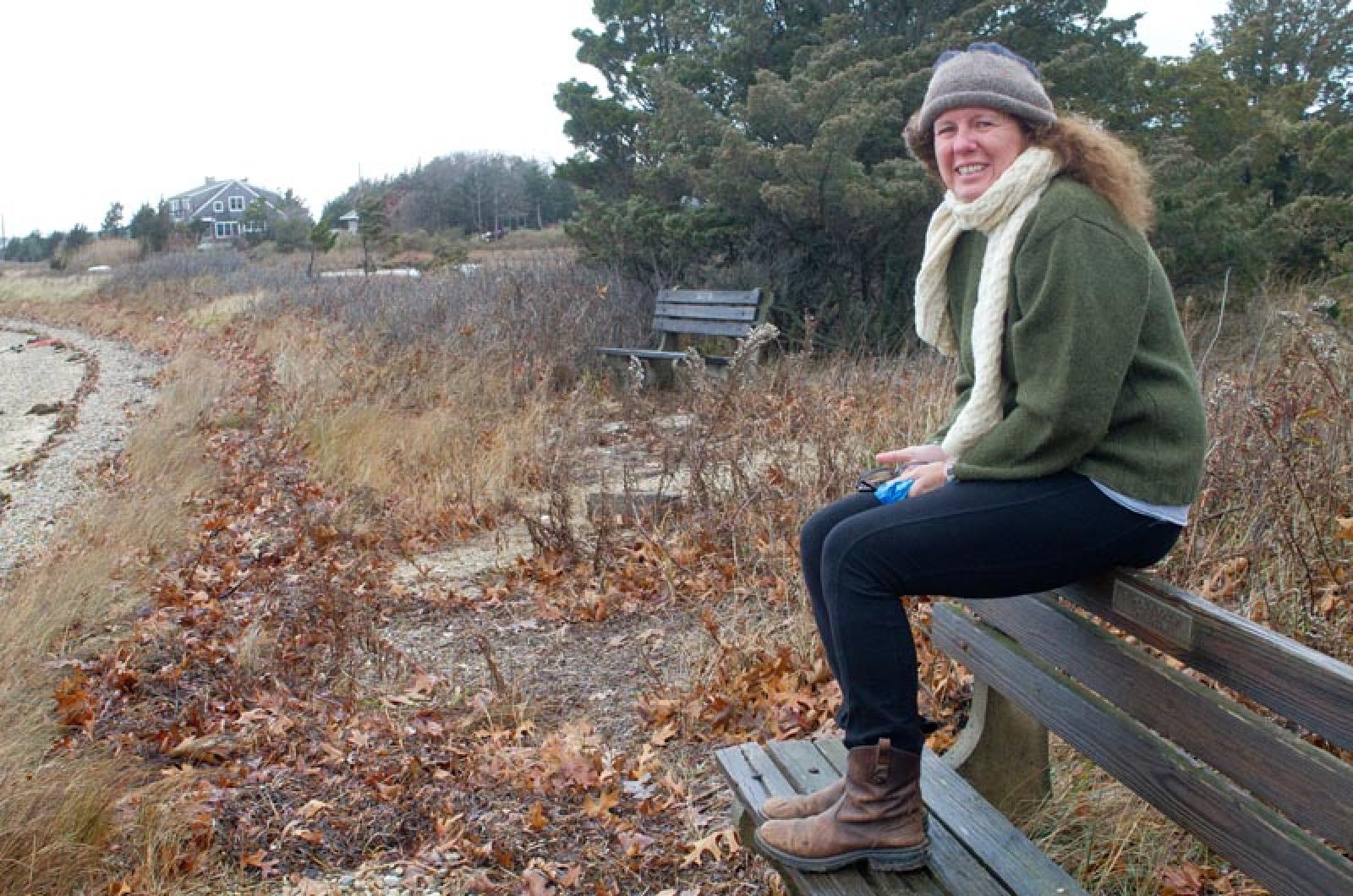Nora Love graduated from college with an accounting degree, but after four and a half years of working as a CPA in Boston, she decided to do something different. In 1994, Ms. Love joined the Peace Corps, and was assigned to a post in Mongolia. A career in accounting became less of a priority.
“When I came out, I wasn’t quite ready to go back to that,” she said in an interview on Wednesday. Ms. Love, who now lives in Oak Bluffs, instead went to work for the International Rescue Committee. She has since worked in several capacities for the non-governmental organization, beginning with projects in Bosnia-Herzegovina. Last Thursday, she returned to the United States from her most recent IRC challenge: setting up an Ebola treatment unit (ETU) in Monrovia, Liberia. The ETU is scheduled to open this weekend.
Less than a week after Ms. Love returned to the Vineyard, Time Magazine announced its Person of the Year for 2014. The magazine had chosen the Ebola fighters — the men and women working to stem and stop the spread of the deadly virus, which has reached epidemic levels in parts of West Africa.
Ms. Love heard the news when a fellow dog walker called her and informed her that she, too, was a Person of the Year. Ms. Love owns a Great Dane named Loki who is from Kenya.
In a phone conversation with the Gazette, Ms. Love spoke of the medical workers fighting Ebola.
“The doctors from Sierra Leone and Liberia, they are definitely front line,” she said. “It’s nice to see that recognition for them.”
The IRC’s work in Liberia was initially focused on community outreach and supporting others who were engaged in treatment procedures. But in mid September, Ms. Love said, “the need for other actors . . . was really magnified.” She traveled to Liberia at the end of September to begin work as a project manager for the ETU job.
There were few ETUs in Monrovia at the time, and those that were in place had been set up hastily.
“The idea was to get additional centers set up so they could take on the case load,” Ms. Love said. The IRC center was planned to be a 100-bed unit. The facility itself was constructed by United Nations crews. IRC partnered with the United States government to get the unit up and running.
This wasn’t Ms. Love’s first assignment in Monrovia. She went in the early 2000s, shortly after the second Liberian civil war. And it wasn’t the first emergency zone she has traveled to this year. In January and February, she was in South Sudan. In May and June, she was in Iraq.
As an emergency project manager, “You go in and get things going,” Ms. Love said. Then the project is handed over to a permanent staff.
“There’s a lot of work you have to do to get it right,” she said. Top priorities are staff training and securing personal protection equipment for staffers.
Ms. Love and other IRC staffers also worked to demystify the Ebola treatment process, bringing people in for tours of the facility so they could see where their families would stay once it opened.
“Ebola’s a very intimate disease,” Ms. Love said. “Your family members and caregivers are the ones getting contaminated.”
In spite of Ms. Love’s previous experiences working in unstable areas, she found that the front lines of a battle against Ebola were different.
“Just the fact that it’s contagious, and you have to be really careful,” she said. “If it’s a war and it’s a conflict, you can see where the lines are.” Because an Ebola outbreak of such scope had never happened before, support staff were constantly learning on the job. And because Liberia is still recovering from a 14-year civil war and rebuilding its infrastructure and health care systems, the situation was even more complicated.
But some basic tenets remained in place.
“You’re making sure that you learn as much as possible [and] providing care with dignity and compassion,” Ms. Love said.
The facility neared its opening date and a permanent project manager came on board, so Ms. Love returned to the United States. Though she would have liked to be there for the opening of the center, she said she is confident in the ETU’s future.
“I know we put a lot of effort into how we were envisioning this care center,” she said
At John F. Kennedy Airport in New York, she was screened for Ebola exposure and determined to be a low risk for the virus. As a safety measure, Ms. Love still takes her temperature twice a day and reports it to the Visiting Nurses of Cape Cod and the Islands. High fever is a symptom of Ebola.
Ms. Love said she did not encounter any resistance or discouragement when she first went to Liberia.
“I haven’t had any bad experience with the decision to go,” she said. In some cases, she said, people are afraid of contracting the disease and pull away from recently returned friends and family.
When Ms. Love first arrived in Monrovia, there were about 100 new cases of Ebola reported every day. When she left, there were about 20.
“I don’t think it’s over,” she said. “I think the signs are good, especially in Liberia. Sierra Leone is struggling. In Liberia, the numbers are getting better.”
As she has done following past assignments, Ms. Love plans to take a couple of months off from emergency work before calling the IRC to see what’s happening and where she might be needed next.
“There’s a lot going on in the emergency world,” she said.




Comments (4)
Comments
Comment policy »